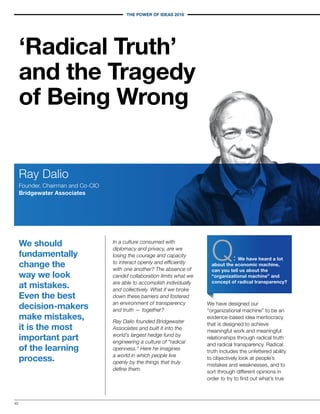
Ray Dalio on 'Radical Truth' and Transparency
- 1. THE POWER OF IDEAS 2016 40 In a culture consumed with diplomacy and privacy, are we losing the courage and capacity to interact openly and efficiently with one another? The absence of candid collaboration limits what we are able to accomplish individually and collectively. What if we broke down these barriers and fostered an environment of transparency and truth — together? Ray Dalio founded Bridgewater Associates and built it into the world’s largest hedge fund by engineering a culture of “radical openness.” Here he imagines a world in which people live openly by the things that truly define them. Q: We have heard a lot about the economic machine, can you tell us about the “organizational machine” and concept of radical transparency? We have designed our “organizational machine” to be an evidence-based idea meritocracy that is designed to achieve meaningful work and meaningful relationships through radical truth and radical transparency. Radical truth includes the unfettered ability to objectively look at people’s mistakes and weaknesses, and to sort through different opinions in order to try to find out what’s true ‘Radical Truth’ and the Tragedy of Being Wrong Founder, Chairman and Co-CIO Bridgewater Associates Ray Dalio We should fundamentally change the way we look at mistakes. Even the best decision-makers make mistakes, it is the most important part of the learning process.
- 2. MILKEN INSTITUTE 41 and how to best deal with these truths. Radical transparency includes the ability of everyone to see virtually everything so that they can form their own opinions rather than have to rely on the interpretations (or spin) of others. I believe that radical truth and radical transparency are essential for having a real idea meritocracy. Q: How did you develop your philosophy, and how has it shaped Bridgewater? I came by this approach a few decades ago by living in a world in which succeeding as an investor meant that I had to make untold numbers of decisions that provided clear penalties and rewards based on whether or not they were better than the decisions of the consensus of others. My experiences taught me that I had to think independently and be worried about being wrong, and that I could improve my odds of being right by speaking with the smartest people who disagreed with me so that I could understand their reasoning. By following that process, I learned a lot, as well as improved my odds of making good decisions. So naturally when I gathered people around me to make my company, I wanted to bring together smart people who would thoughtfully disagree and work themselves through a process that would provide both learning and better decisions. I also believed that for people to be really committed to an organization or system, they have to believe that the rules of the system are fair. For those reasons, I created our evidence-based idea meritocracy. Q: Can your principles be applied more broadly — for instance can they be applied to government as well as business? Certainly. I think the greatest tragedy of mankind is that people confidently hold wrong opinions that they make bets on, which causes them and those around them to bear the needless tragic results. It’s a tragedy because decision-making can so easily be improved by knowing how to disagree well to get to the best answers based on how believable different people are. The main impediments to doing this are structural. For example, in a democracy in which there is one man, one vote, there is a structural impediment to having a real idea meritocracy because not all opinions are equally valuable. There’s a risk of having emotional, uninformed people choosing incompetent leaders. However, for almost all organizations that get to set their own rules, having an idea meritocracy that is radically truthful and radically transparent is possible, though not easy. Q: How do you get people to accept these ideas in a culture such as ours, that is so politicized and has so little tolerance for mistakes? There has to be a fundamental change in people’s attitudes about mistakes and not knowing answers so that there is broad acceptance of these things. People have to understand that even the best decision-makers make mistakes, and that making mistakes is the most important part of the learning process. People also have to realize that learning is more important than knowing because, for everyone, what is unknown is far greater that what can possibly be known. So we have to be radically open-minded to be successful. I believe our education system, which values being right and penalizes being wrong, has contributed to society’s mistake phobia. Eradicating this fear will be very difficult, but it is essential for success to be achieved. If enough people believe it and put it into practice in organizations, people will see it working, and that will lead to beneficial changes where they now seem impossible. Q: What is the most powerful aspect of this concept? What is the weakest? The most powerful concept is that there is a way to radically improve your decision-making and your organization’s cohesiveness by knowing how to have high-quality, totally honest disagreement that is well-processed to make the best possible decisions. The greatest weakness of this concept is that it requires people to rise above the ego barriers and blind spots that keep them emotionally attached to their wrong opinions, which isn’t easy.
